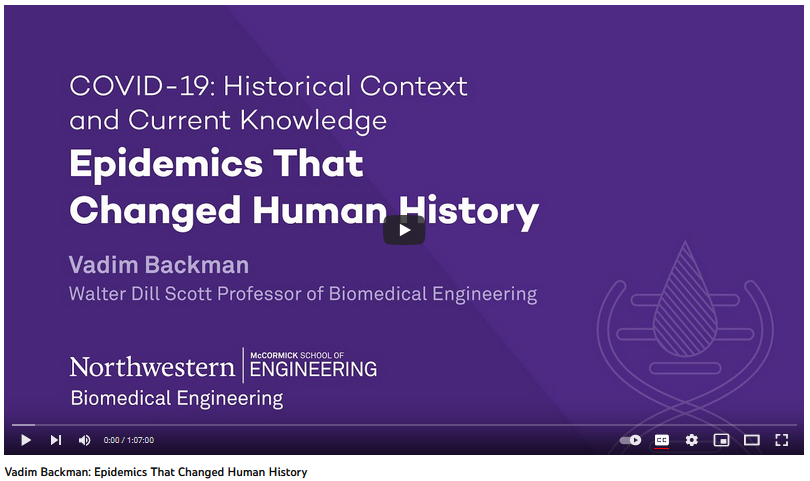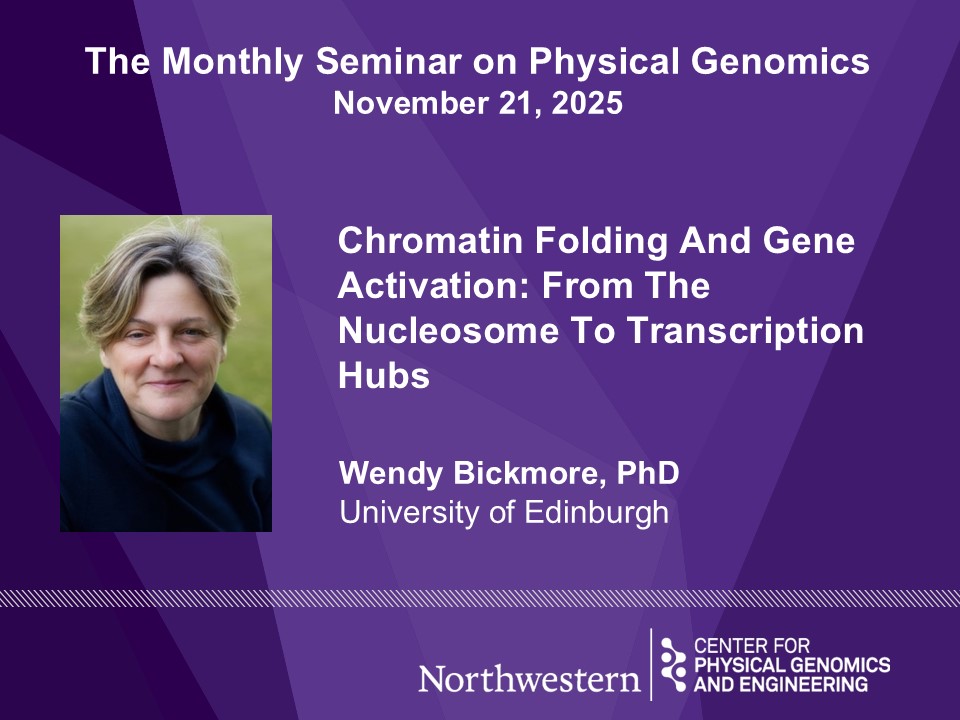
Video Archive

Watch on YouTube
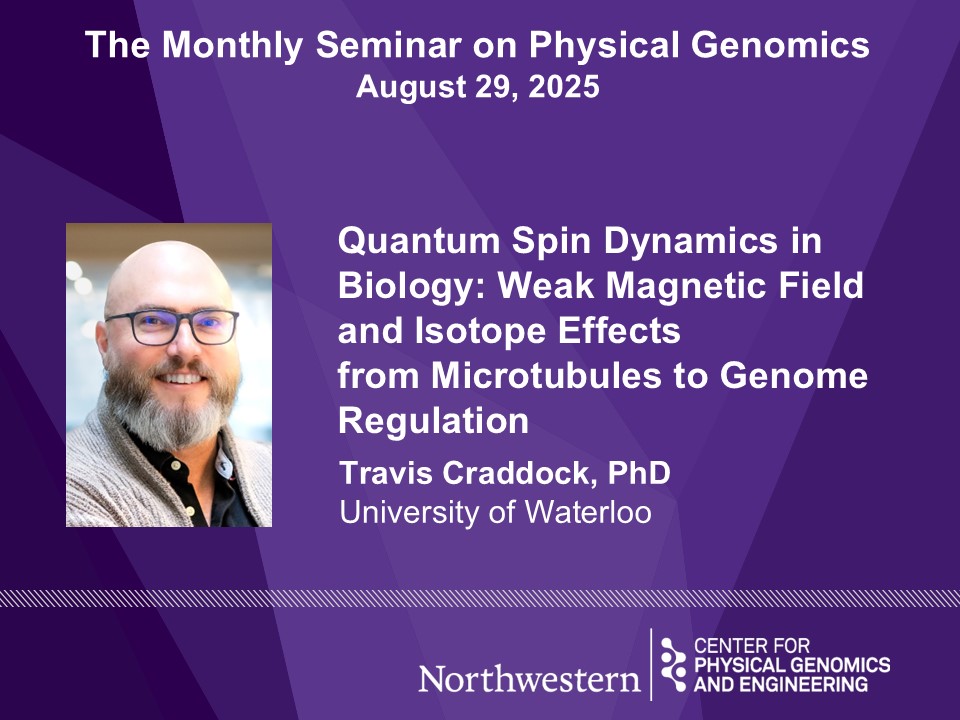
Travis Craddock - Quantum Spin Dynamics in Biology: Weak Magnetic Field and Isotope Effects from Microtubules to Genome Regulation
Prof. Travis Craddock presents the August 2025 Monthly Seminar on Physical Genomics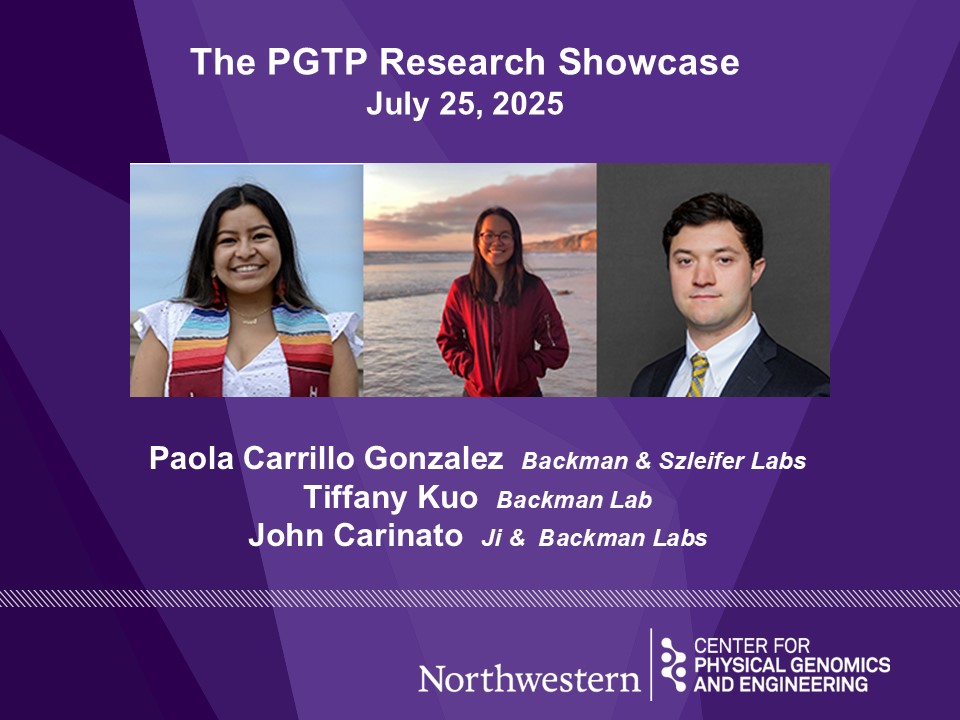
2025 Physical Genomics Training Program Research Showcase
Trainees from the CPGE T32 training program discuss their cutting-edge, convergent research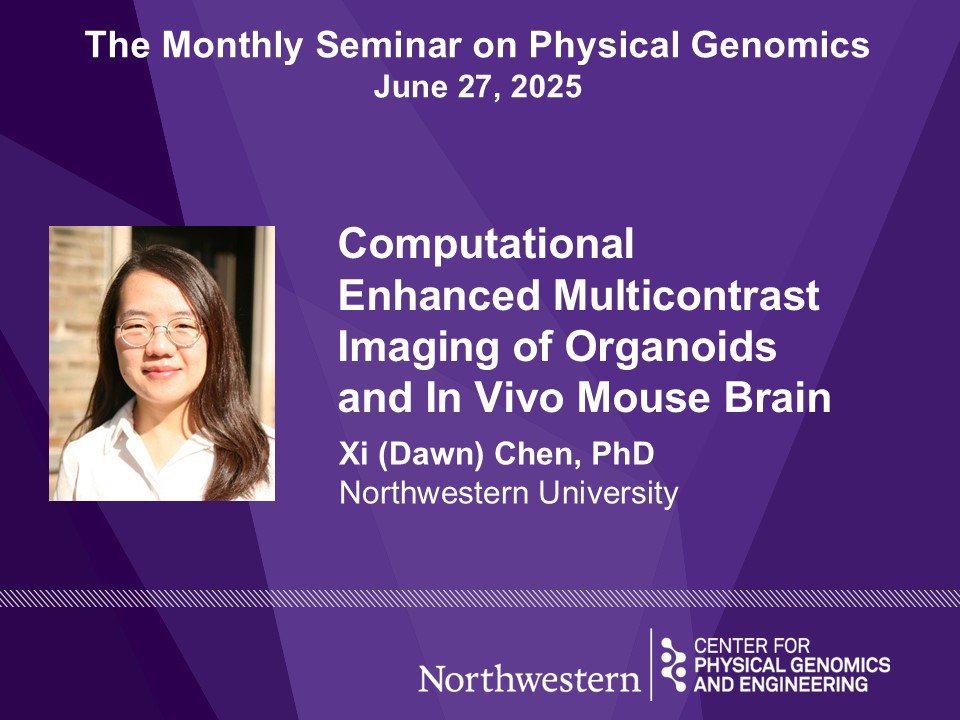
Dawn Chen - Computational Enhanced Multicontrast Imaging of Organoids and In Vivo Mouse Brain
Prof. Xi (Dawn) Chen presents the June 2025 Monthly Seminar on Physical Genomics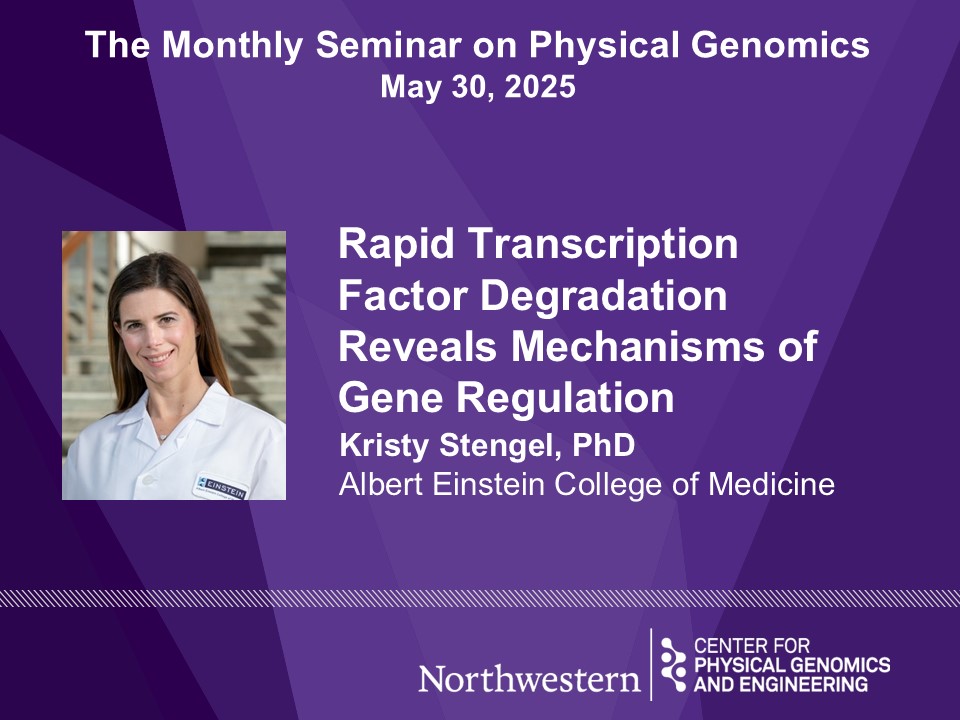
Kristy Stengel - Rapid Transcription Factor Degradation Reveals Mechanisms of Gene Regulation
Prof. Kristy Stengel presents the May 2025 Monthly Seminar on Physical Genomics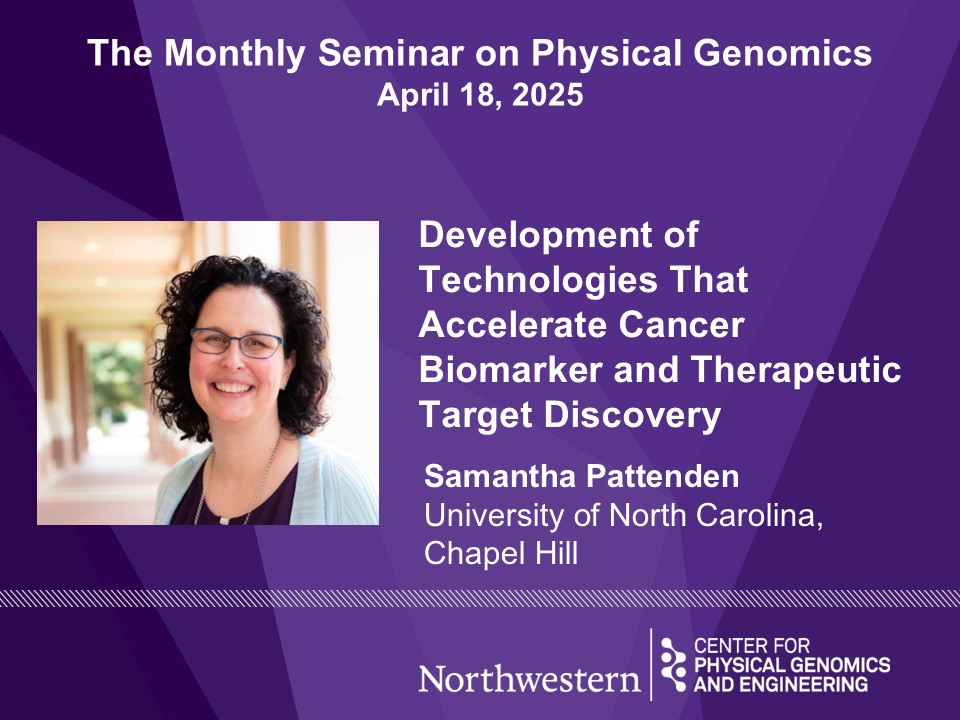
Samantha Pattenden - Technologies That Accelerate Cancer Biomarker and Therapeutic Target Discovery
Prof. Samantha Pattenden presents the April 2025 Monthly Seminar on Physical Genomics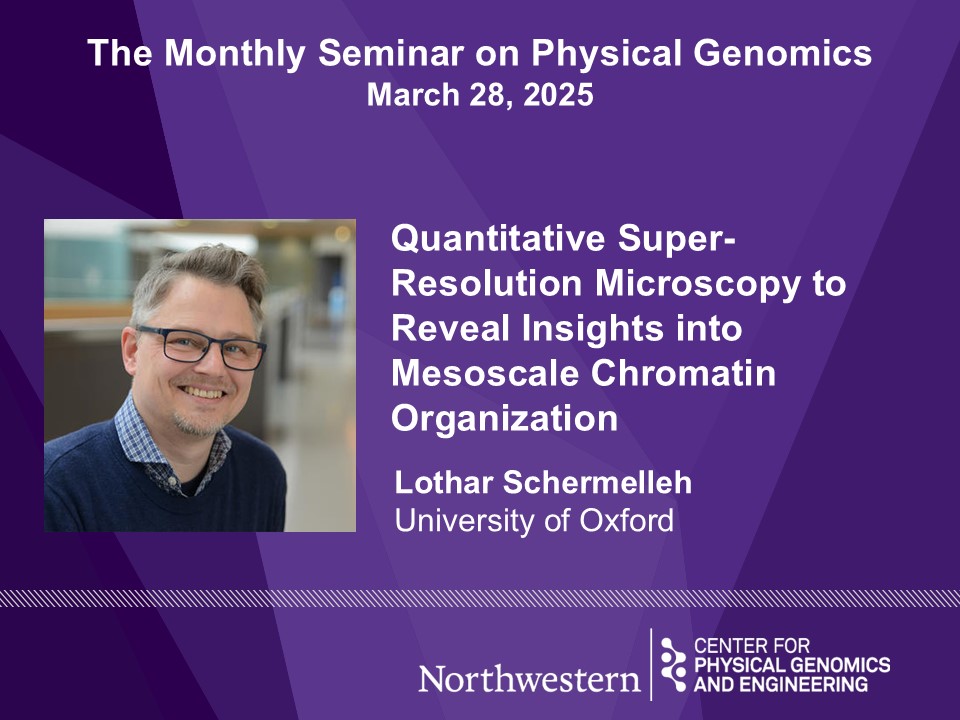
Lothar Schermelleh - Quantitative Super-Resolution Microscopy to Reveal Insights into Mesoscale Chromatin Organization
Prof. Lothar Schermelleh presents the March 2025 Seminar on Physical Genomics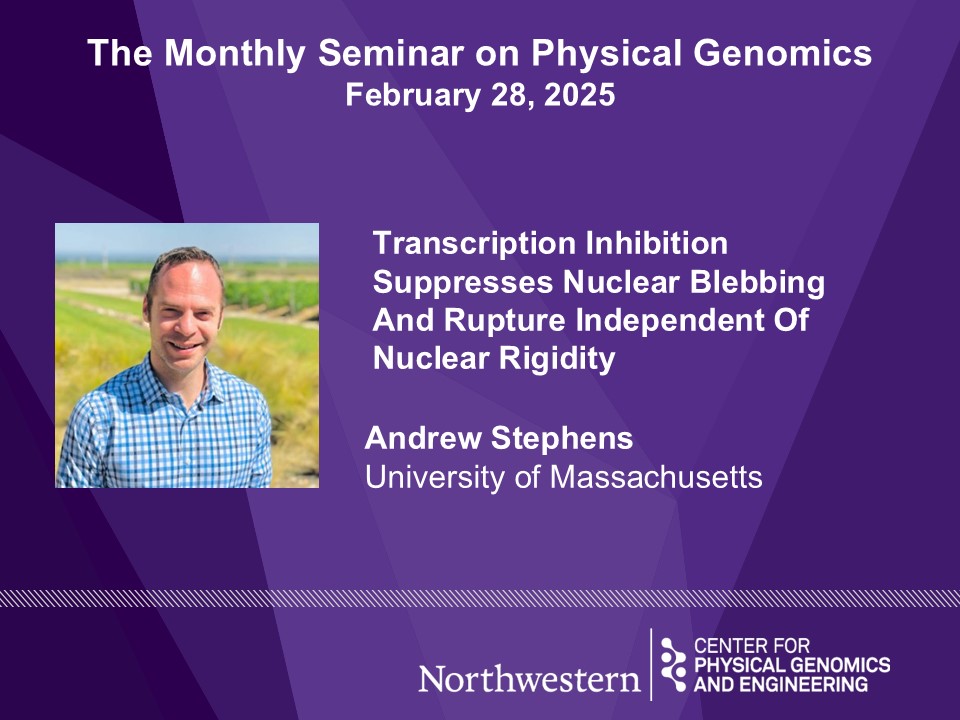
Andrew Stephens - Transcription Inhibition Suppresses Nuclear Blebbing And Rupture Independent Of Nuclear Rigidity
Prof. Andrew Stephens of University of Massachusetts Amherst presents the February 2025 Seminar on Physical Genomics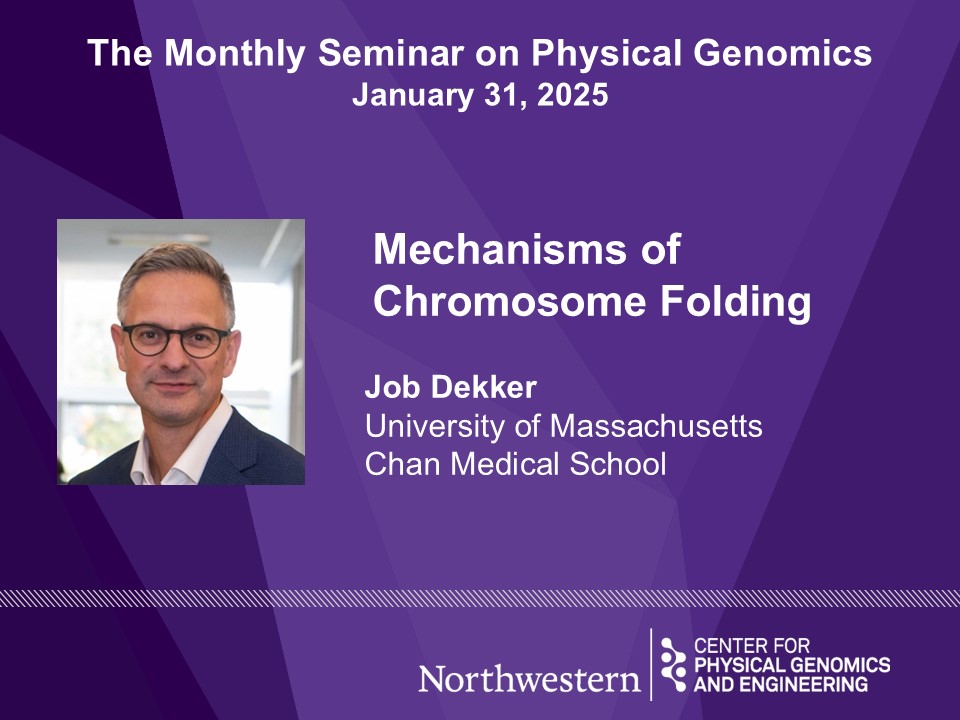
Job Dekker - Mechanisms of Chromosome Folding
Prof. Job Dekker of University of Massachusetts presents the January 31 Seminar on Physical Genomics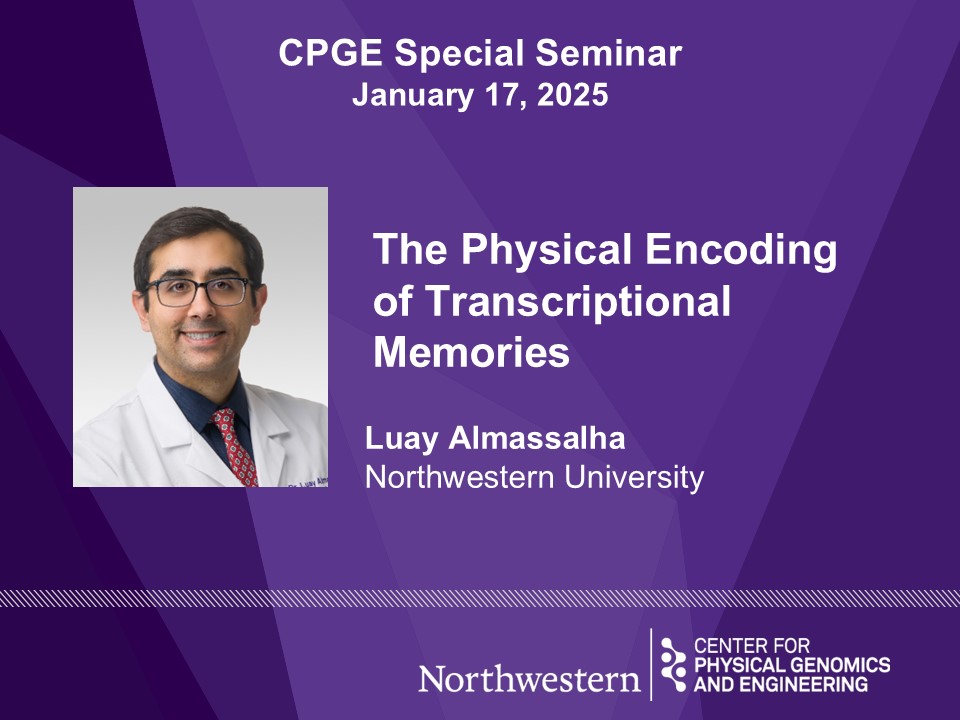
Luay Almassalha - The Physical Encoding of Transcriptional Memories
Dr. Luay Almassalha of the Feinberg School of Medicine discusses recent studies showing the genome to be an emergent, reinforcement learning computational device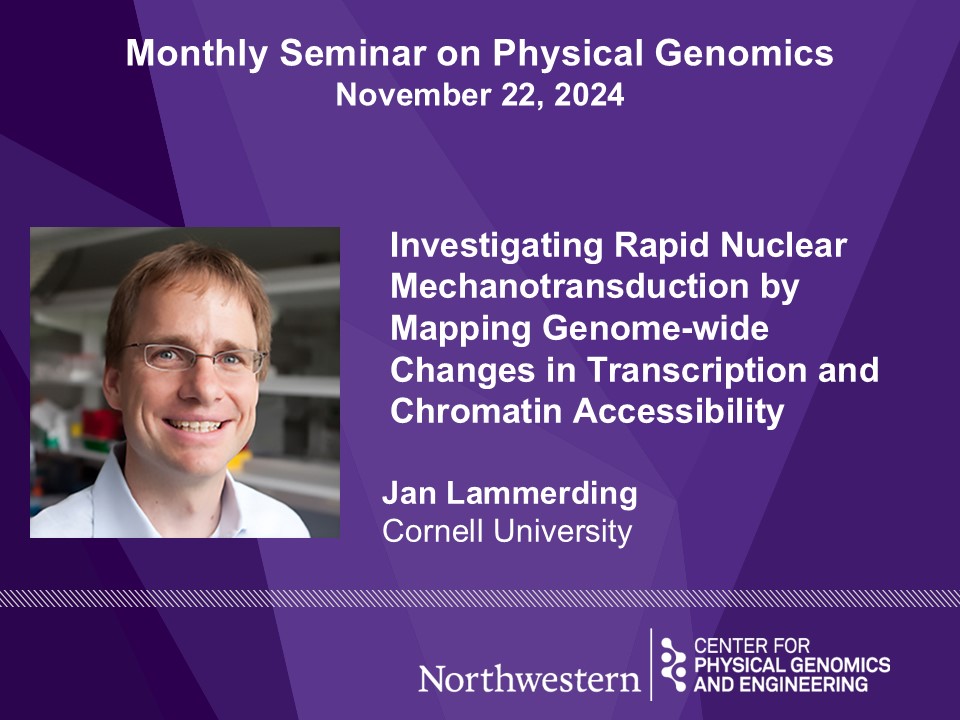
Jan Lammerding - Investigating Rapid Nuclear Mechanotransduction by Mapping Genome-wide Changes in Transcription and Chromatin Accessibility
Jan Lammerding of Cornell University presents the November 2024 Monthly Seminar on Physical Genomics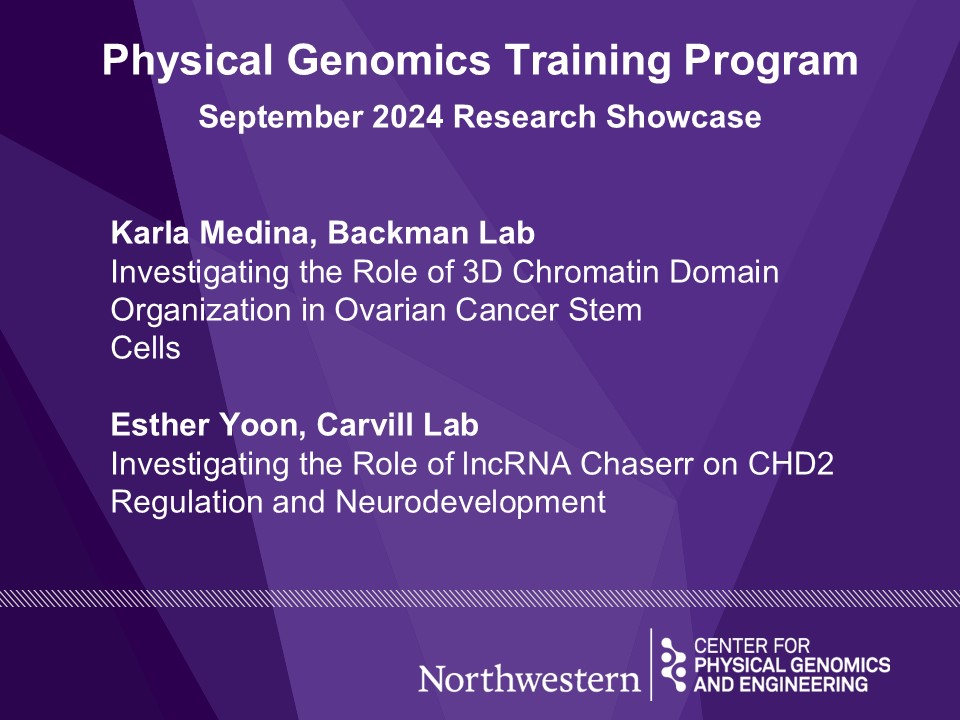
Physical Genomics Training Program Fall 2024 Research Showcase
Karla Medina, PhD student, Backman LabInvestigating the Role of 3D Chromatin Domain Organization in Ovarian Cancer Stem Cells
Esther Yoon, PhD student, Carvill Lab
Investigating the Role of lncRNA Chaserr on CHD2 Regulation and Neurodevelopment
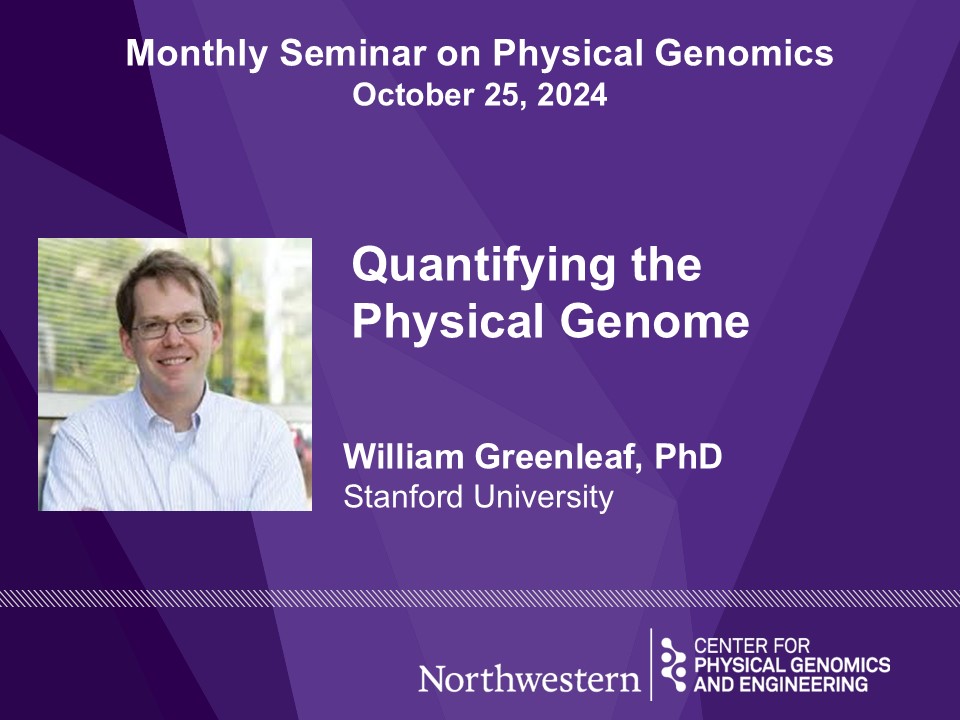
William Greenleaf - Quantifying the Physical Genome
William Greenleaf of Stanford University presents the October 2024 Monthly Seminar on Physical Genomics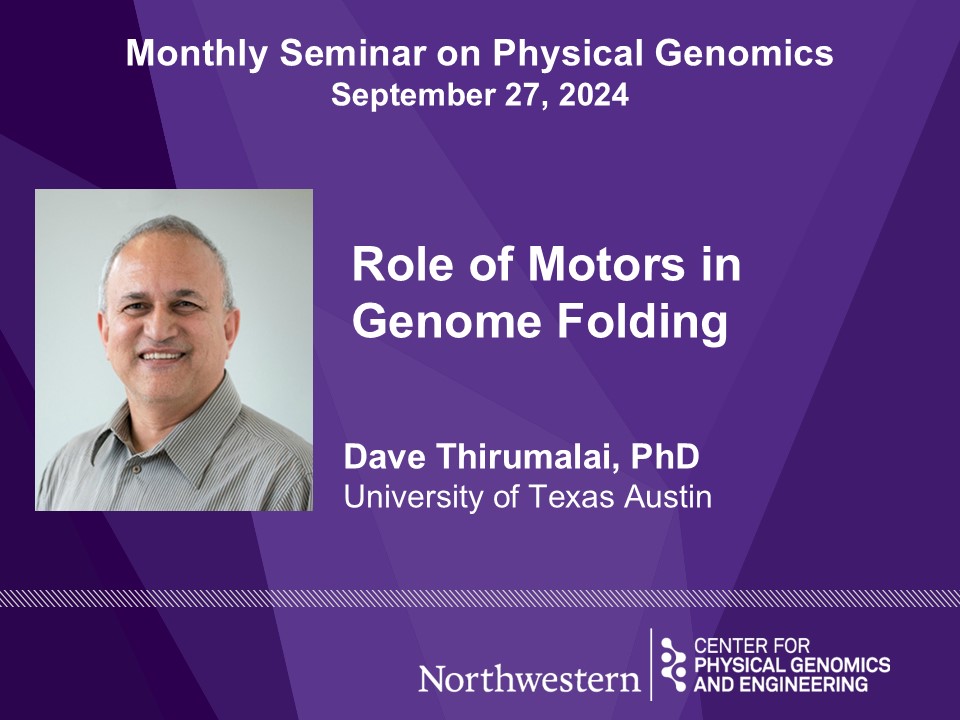
Dave Thirumalai - Role of Motors in Genome Folding
Dr. Dave Thirumalai of UT-Austin presents the September 2024 Monthly Seminar on Physical Genomics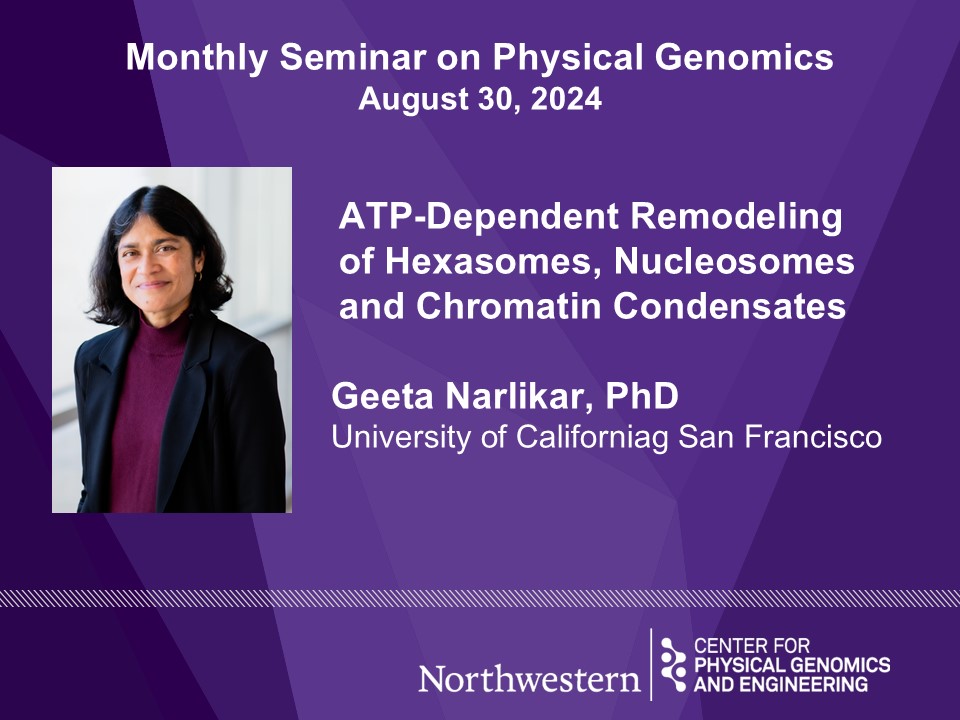
Geeta Narlikar - ATP-Dependent Remodeling of Hexasomes, Nucleosomes and Chromatin Condensates
Dr. Geeta Narlikar of UCSF presents the August 2024 Monthly Seminar on Physical Genomics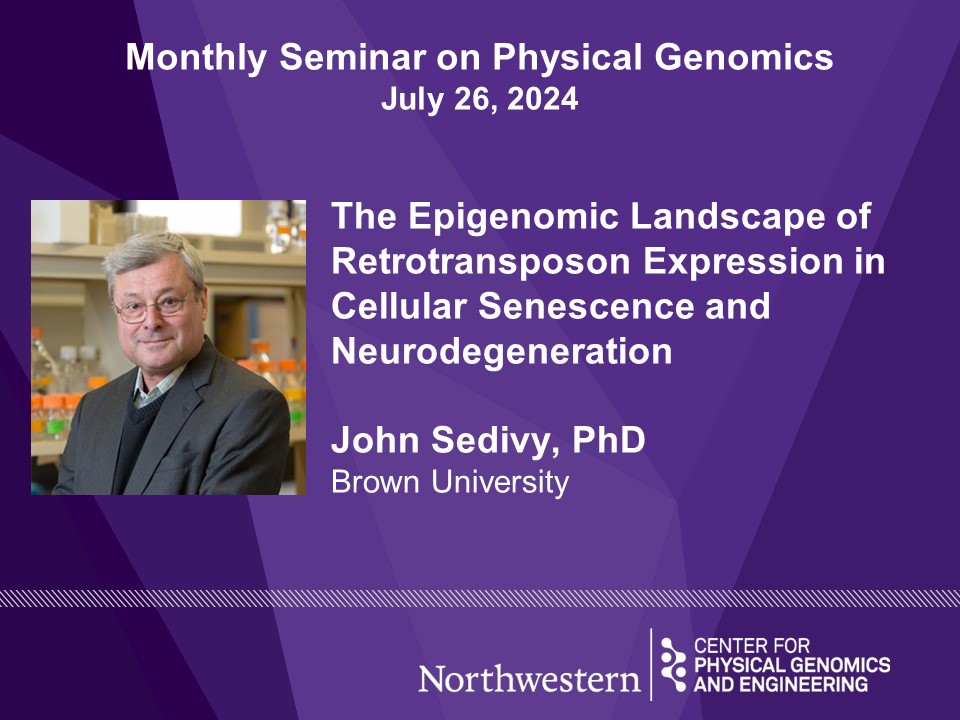
John Sedivy - The Epigenomic Landscape of Retrotransposon Expression in Cellular Senescence and Neurodegeneration
Dr. John Sedivy of Brown University presents the July 2024 Monthly Seminar on Physical Genomics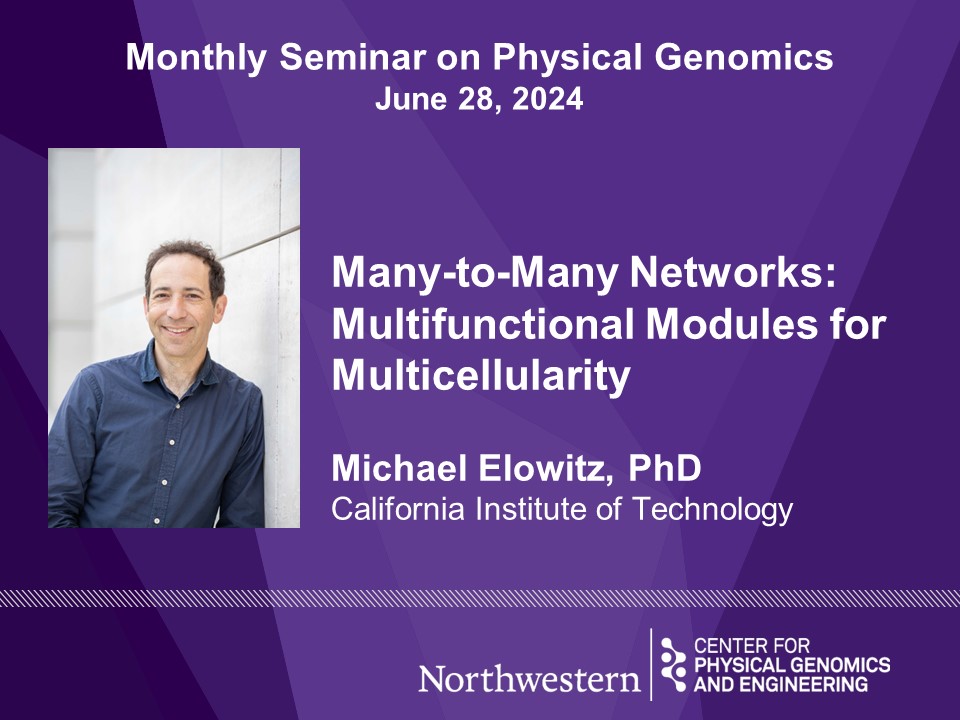
Michael Elowitz - Many-to-Many Networks: Multifunctional Modules for Multicellularity
Dr. Michael Elowitz of the California Institute of Technology presents the June 2024 Monthly Seminar on Physical Genomics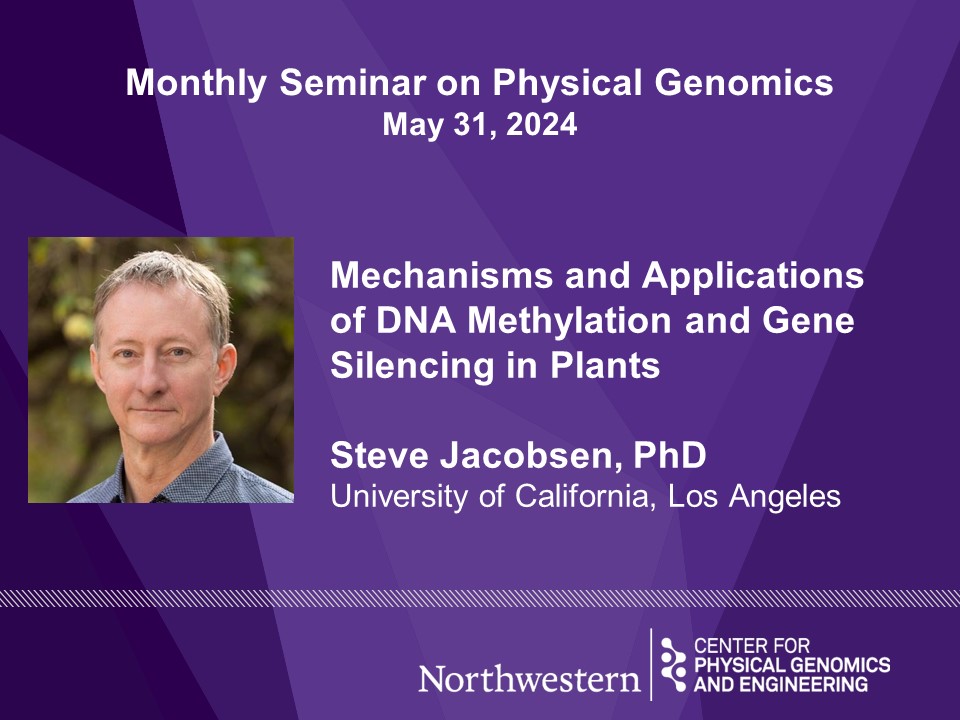
Steve Jacobsen - Mechanisms and Applications of DNA Methylation and Gene Silencing in Plants
Dr. Steve Jacobsen of UCLA presents the May 2024 Monthly Seminar on Physical Genomics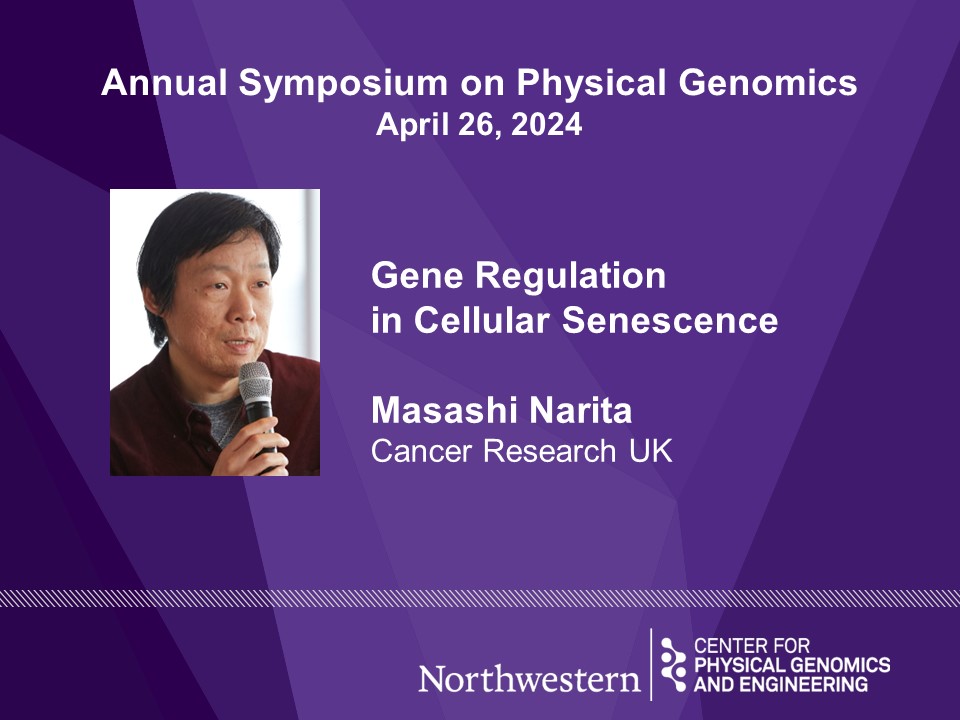
Masashi Narita - Gene Regulation in Cellular Senescence
Dr. Masashi Narita of Cancer Research UK presents the keynote lecture at the 2024 Symposium on Physical Genomics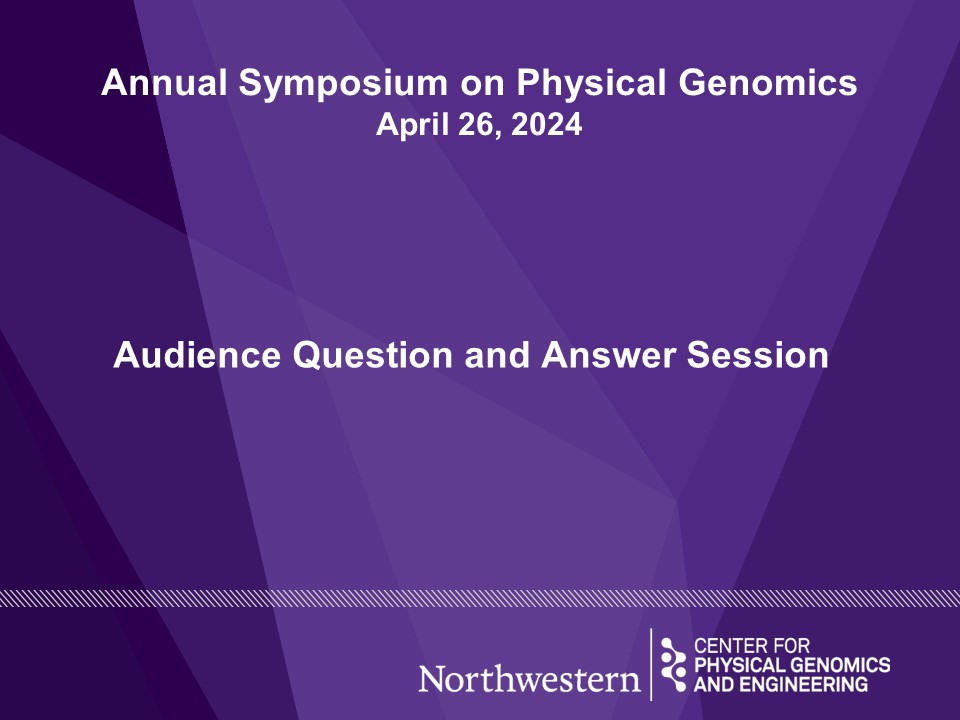
Morning Q&A Session
Profs. Narita, Lakadamyali and Huang answer audience questions at the 2024 Symposium on Physical Genomics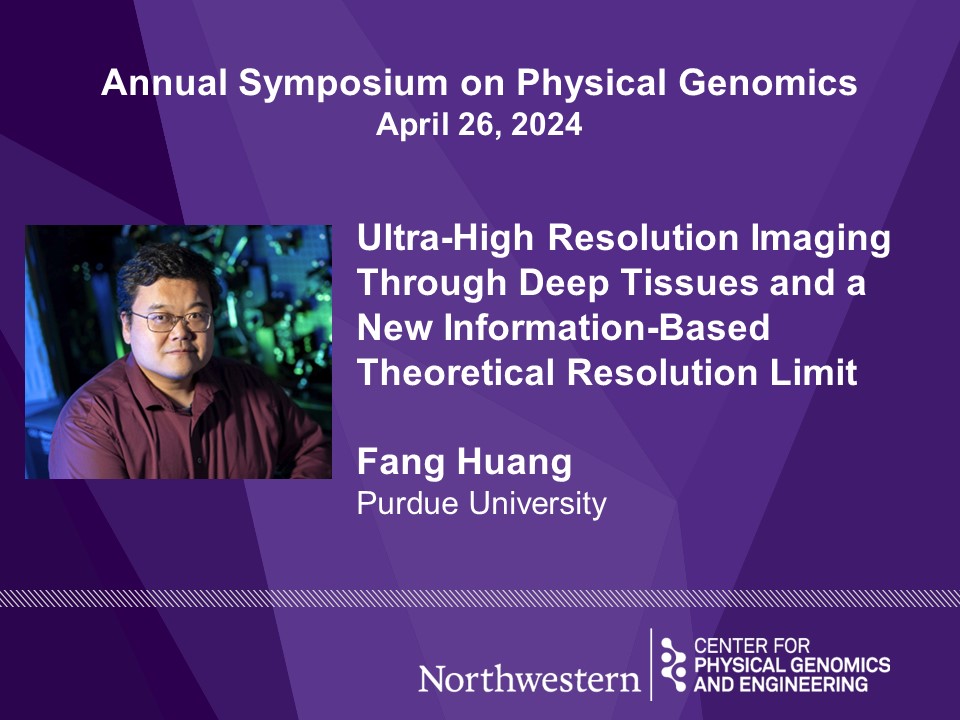
Fang Huang - Ultra-Resolution Imaging Through Deep Tissue and a New Information-Based Theoretical Resolution Limit
Dr. Fang Huang of Purdue University presents an invited talk at the 2024 Symposium on Physical Genomics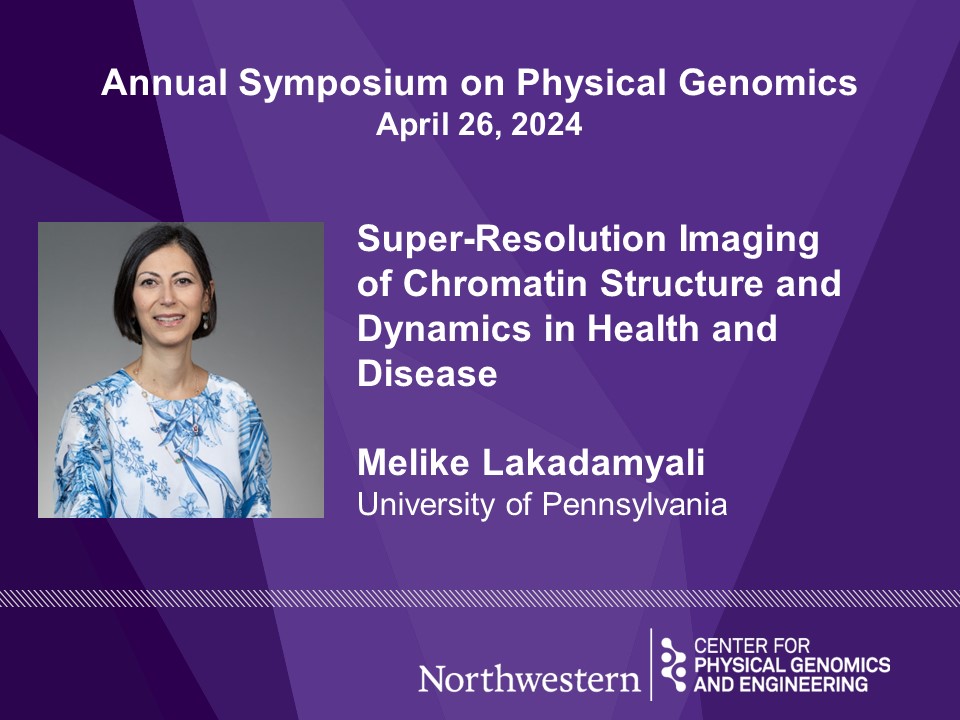
Melike Lakadamyali - Super-Resolution Imaging of Chromatin Structure and Dynamics in Health & Disease
Dr. Melike Lakadamyali of the University of Pennsylvania presents an invited talk at the 2024 Symposium on Physical Genomics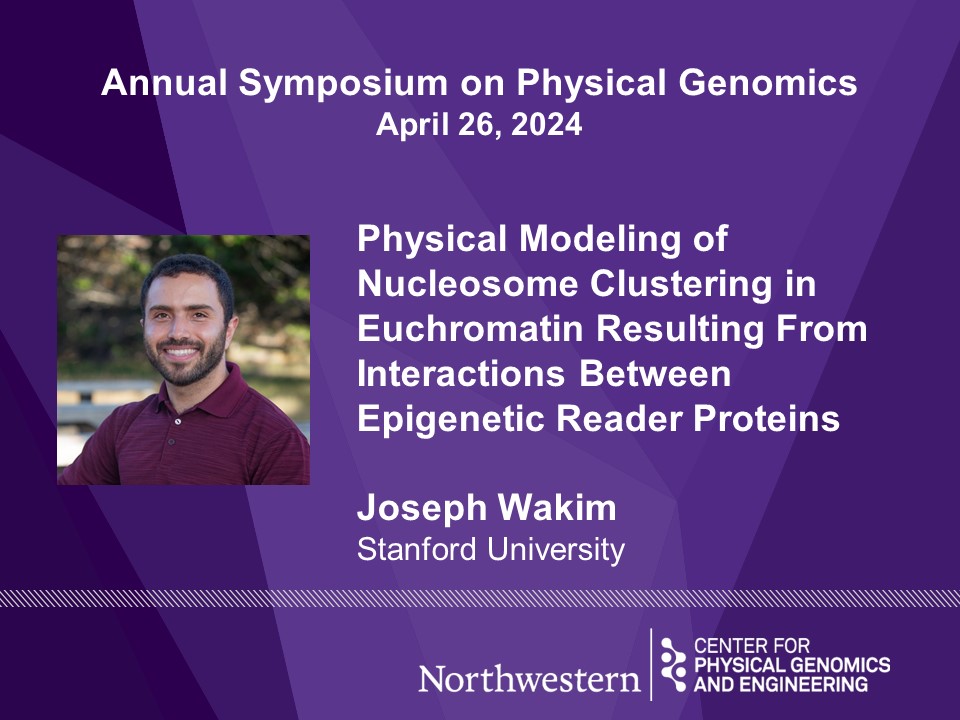
Joseph Wakim - Modeling of Nucleosome Clustering in Euchromatin Resulting from Interactions Between Reader Proteins
Joseph Wakim of the Spakowitz Lab at Stanford University presents an invited talk at the 2024 Symposium on Physical Genomics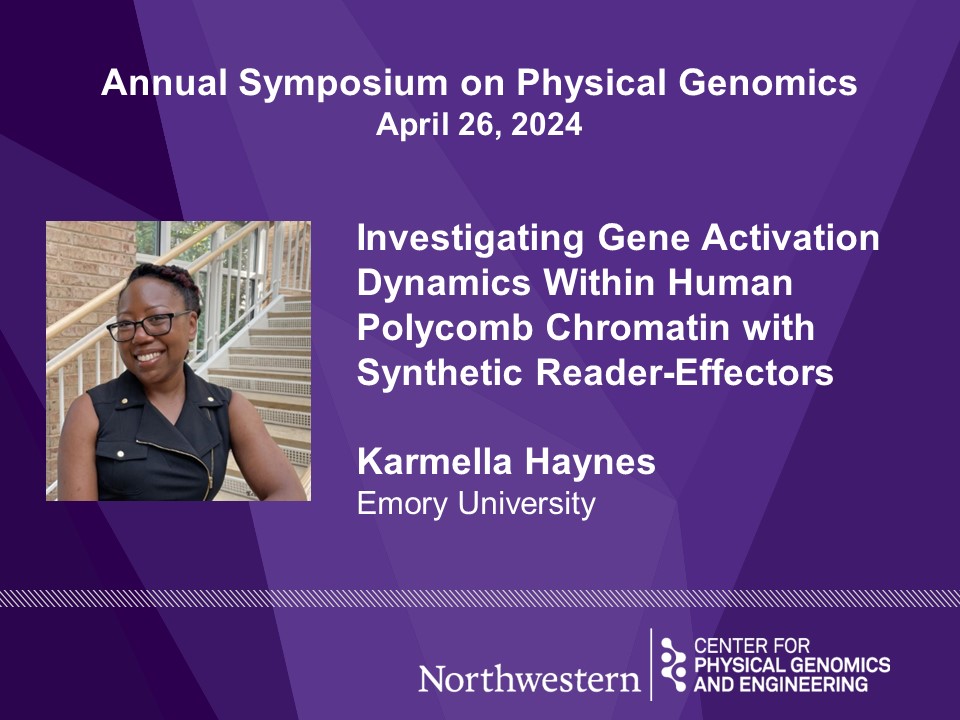
Karmella Haynes - Investigating Gene Activation Dynamics in Human Polycomb Chromatin with Synthetic Reader-Effectors
Dr. Karmella Haynes of Emory University presents an invited talk at the 2024 Symposium on Physical Genomics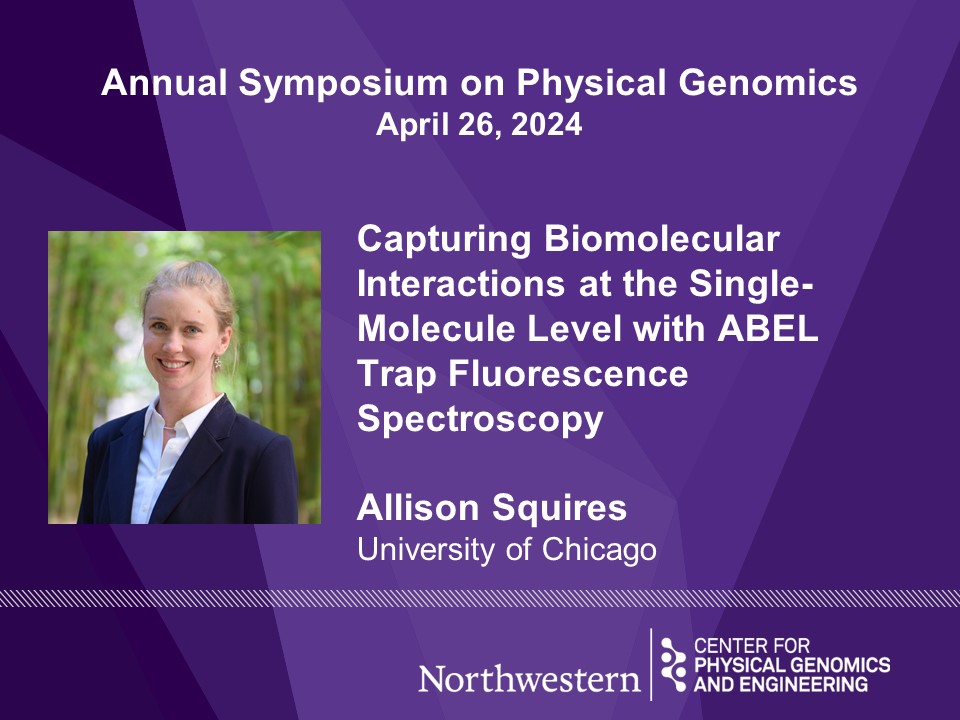
Allison Squires - Capturing Biomolecular Interactions at Single-Molecule Level via ABEL Trap Fluorescence Spectroscopy
Dr. Allison Squires of the University of Chicago presents an invited talk at the 2024 Symposium on Physical Genomics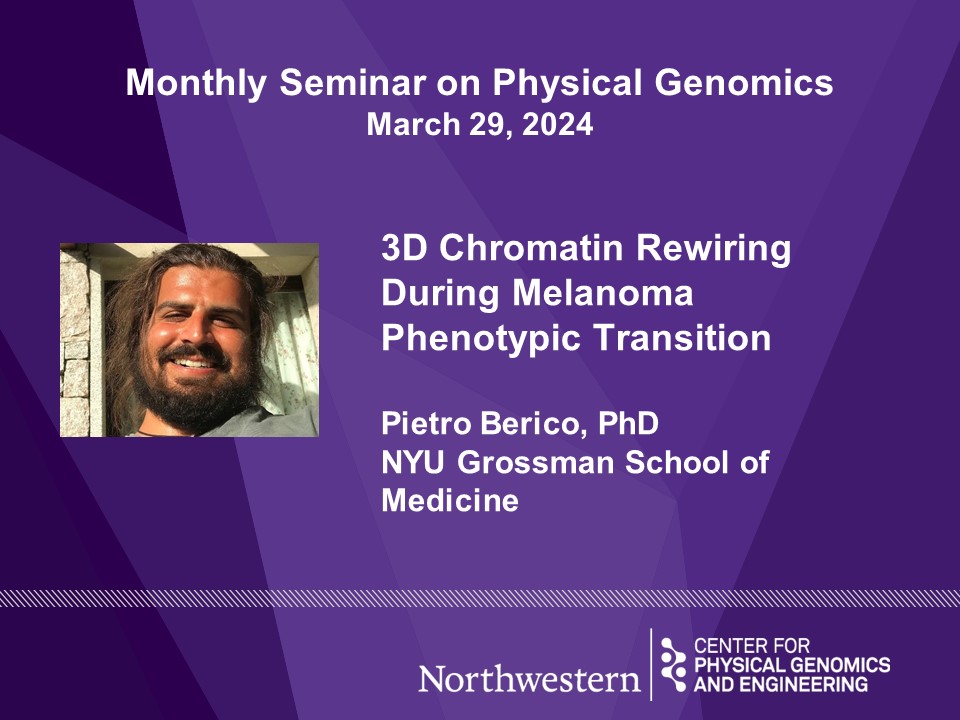
Pietro Berico - 3D Chromatin Rewiring During Melanoma Phenotypic Transition
Dr. Pietro Berico of the NYU Grossman School of Medicine presents the March 2024 Seminar on Physical Genomics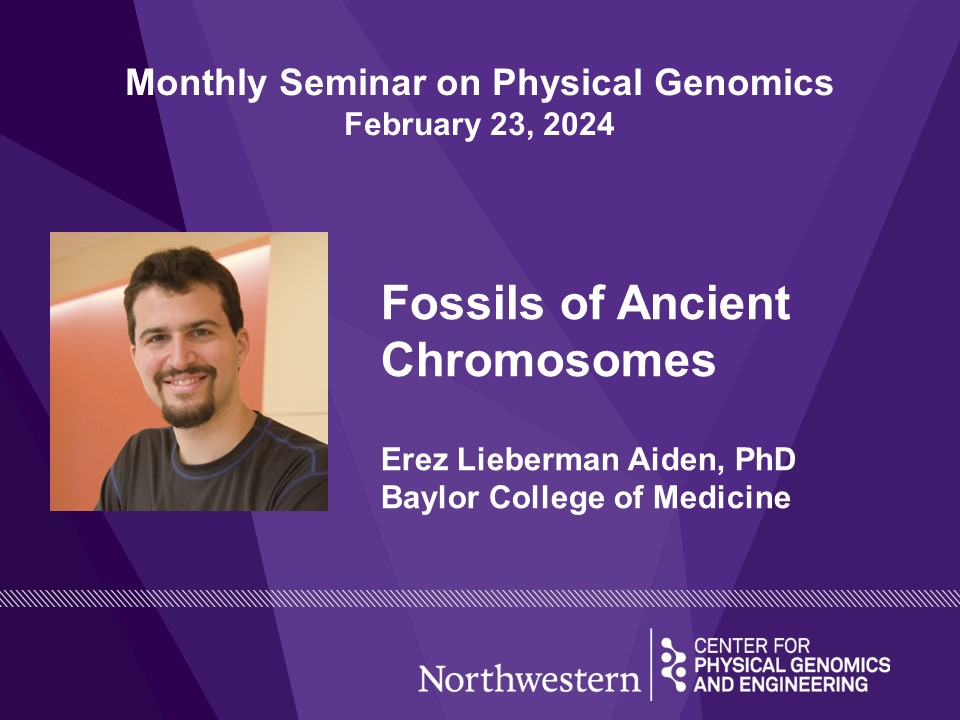
Erez Lieberman Aiden - Fossils of Ancient Chromosomes
Dr. Erez Lieberman Aiden of Baylor College of Medicine presents the February 2024 Seminar on Physical Genomics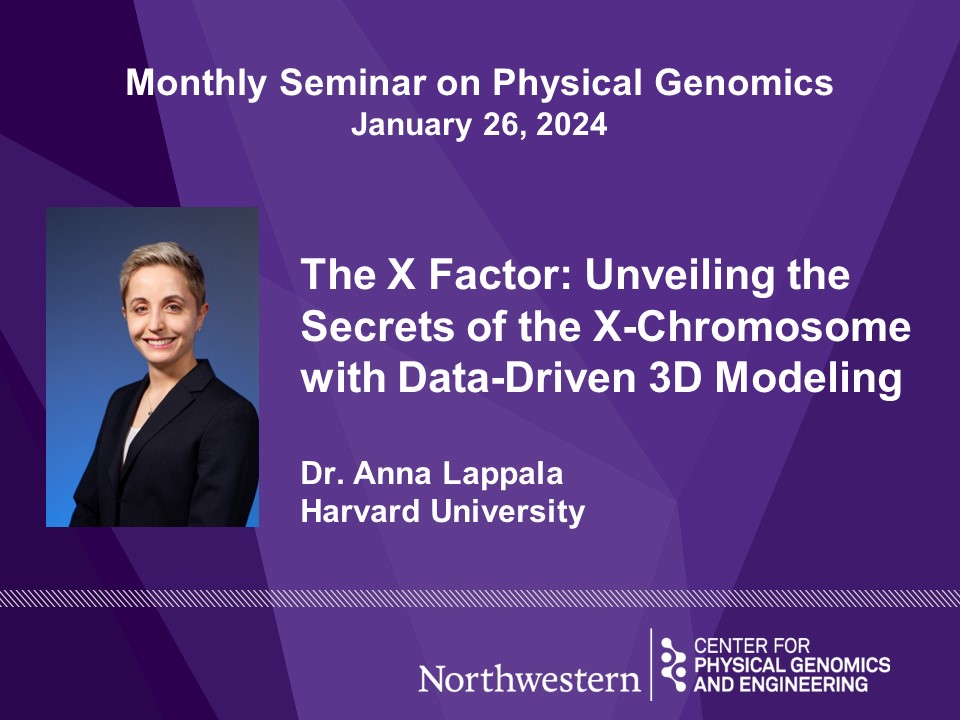
Anna Lappala - The X Factor: Unveiling the Secrets of the X-Chromosome with Data-Driven 3D Modeling
Dr. Anna Lappala of Harvard University presents the January 2024 Seminar on Physical Genomics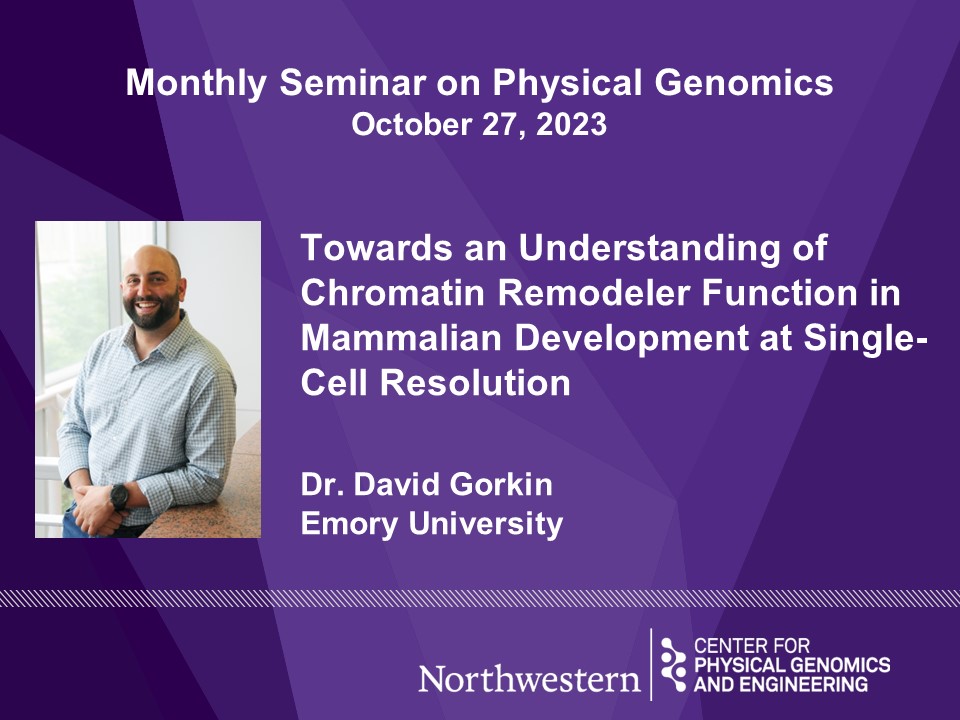
David Gorkin - Towards an Understanding of Chromatin Remodeler Function in Mammalian Development at Single-Cell Resolution
Dr. David Gorkin of Emory University presents the October 2023 Monthly Seminar on Physical Genomics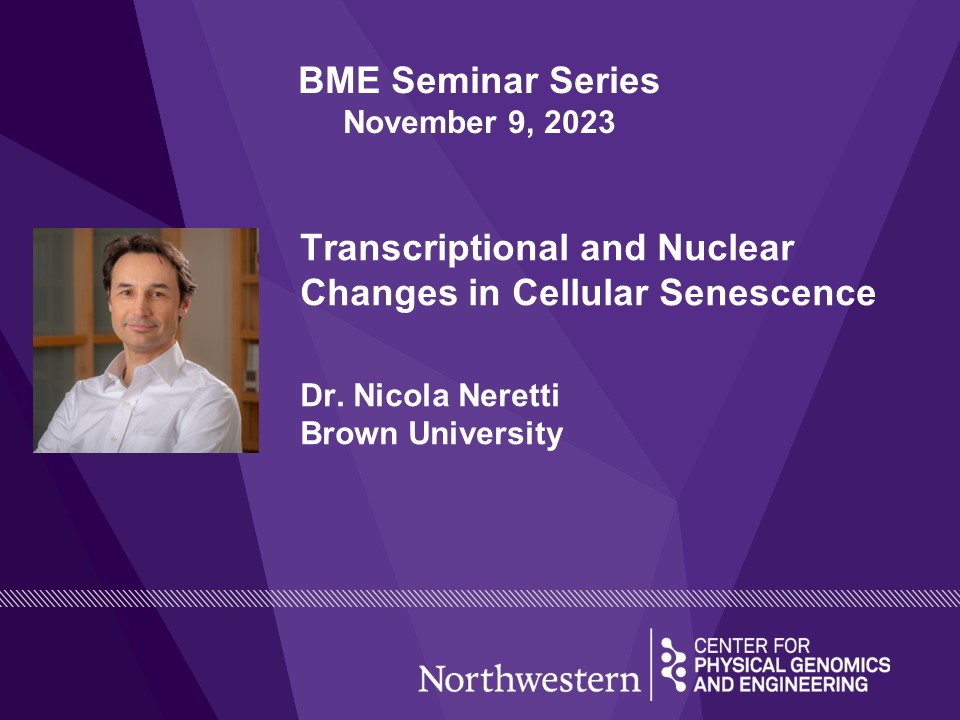
Nicola Neretti: Transcriptional and Nuclear Changes in Cellular Senescence
Dr. Nicola Neretti of Brown University presents the November 2023 BME Seminar Series
Sponsored by the Department of Biomedical Engineering, the Cancer and Physical Sciences Program at the Robert H. Lurie Comprehensive Cancer Center, and the Center for Physical Genomics and Engineering
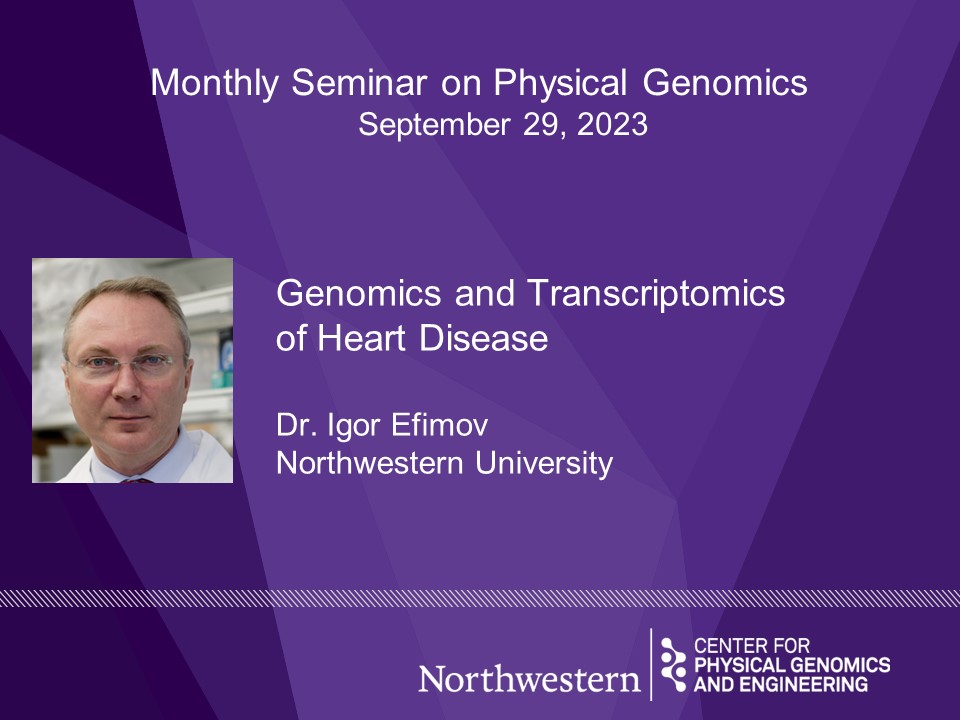
Igor Efimov - Genomics and Transcriptomics of Heart Disease
Dr. Igor Efimov of Northwestern University presents the September 2023 Monthly Seminar on Physical Genomics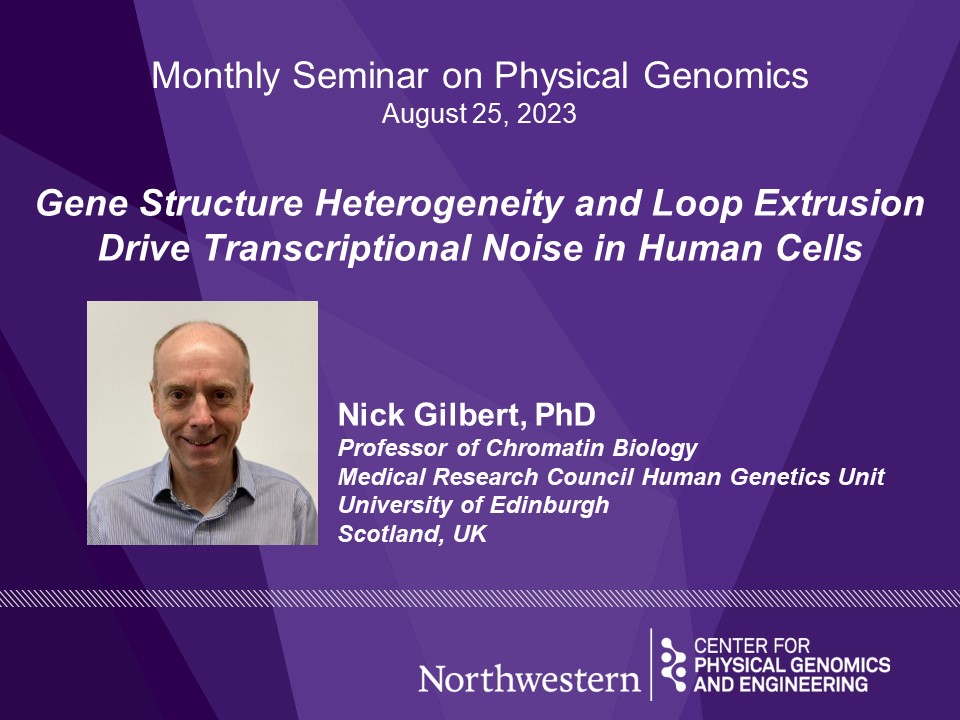
Nick Gilbert - Gene Structure Heterogeneity and Loop Extrusion Drive Transcriptional Noise in Human Cells
Dr. Nick Gilbert of the University of Edinburgh presents the August 2023 Monthly Seminar on Physical Genomics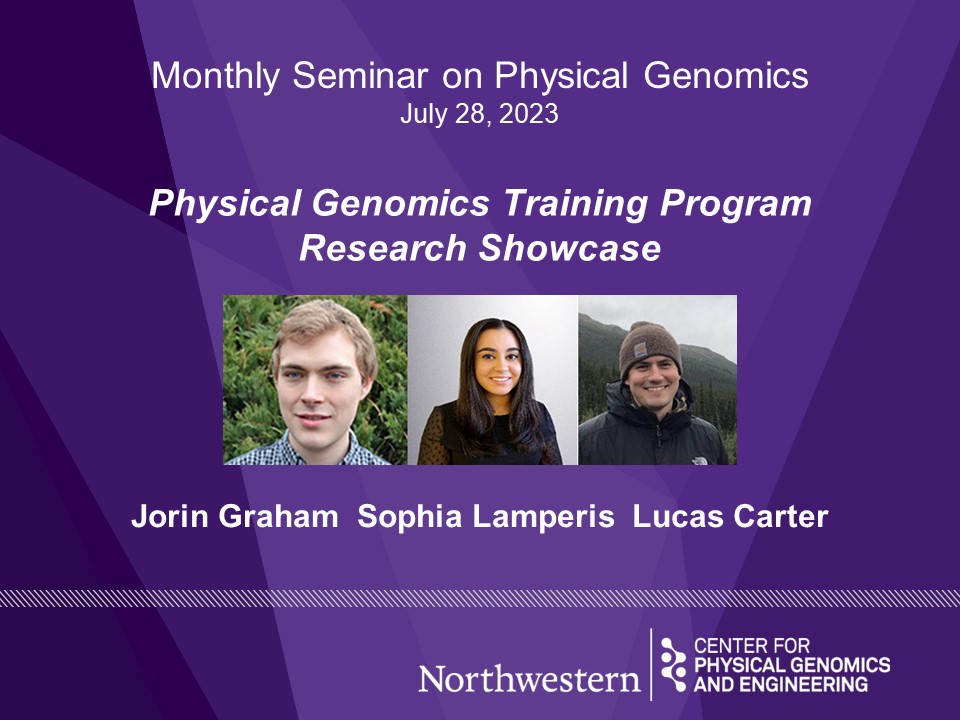
Physical Genomics Training Program Research Showcase
Graduate trainees in the T32 Physical Genomics Training Program at CPGE present their research, with talks by Jorin Graham, Sophia Lamperis and Lucas Carter.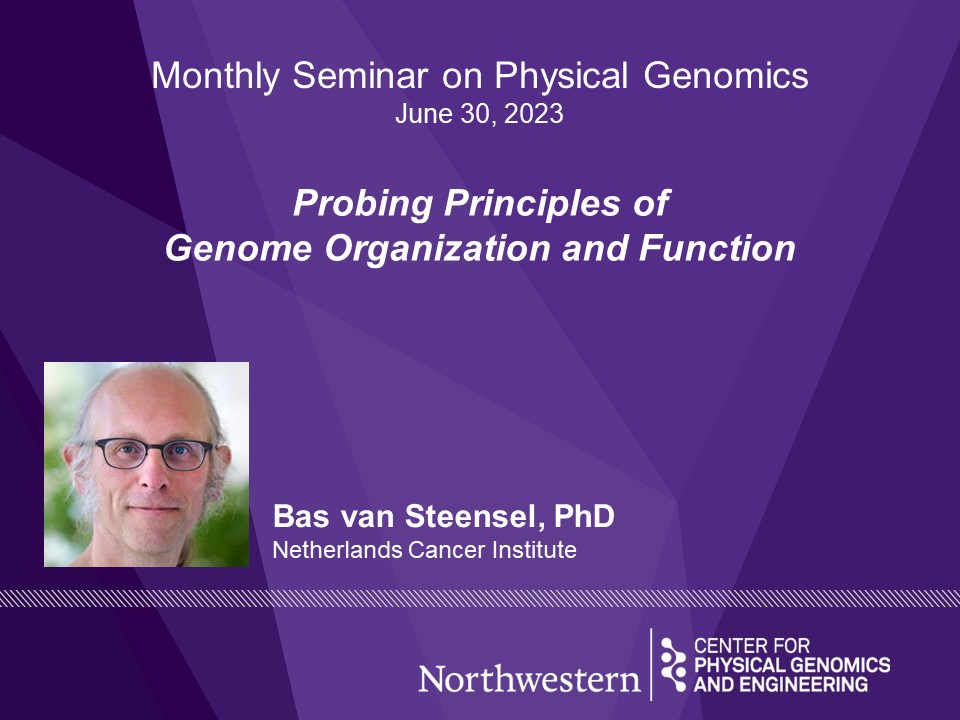
Bas van Steensel - Probing Principles of Genome Organization and Function
Dr. Bas van Steensel of the Netherlands Cancer Institute presents the June 2023 Monthly Seminar on Physical Genomics.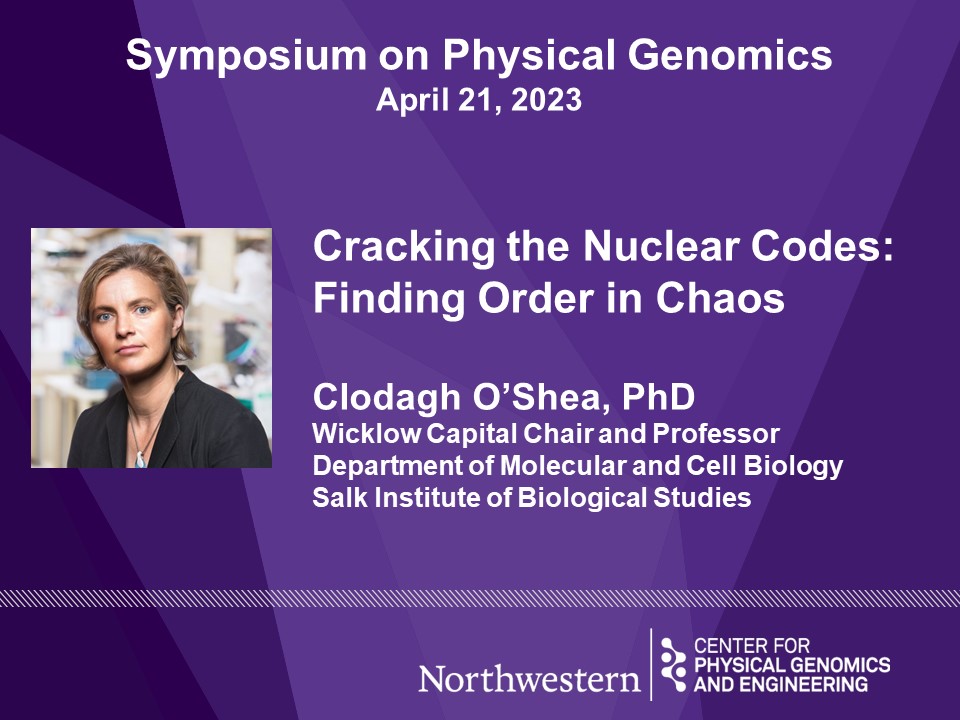
Clodagh O'Shea - Cracking the Nuclear Codes: Finding Order in Chaos
Dr. Clodagh O'Shea of the Salk Institute of Biological Studies delivers the keynote lecture at the 2023 Symposium on Physical Genomics.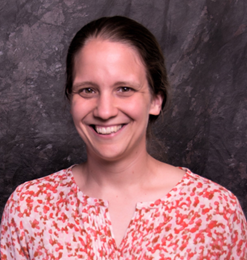
Rachel Patton McCord - Alterations in Spatial Genome Compartmentalization Associated with Constriction and Expansion
Dr. Rachel Patton McCord of the University of Tennessee presents the May 2023 Monthly Seminar on Physical Genomics.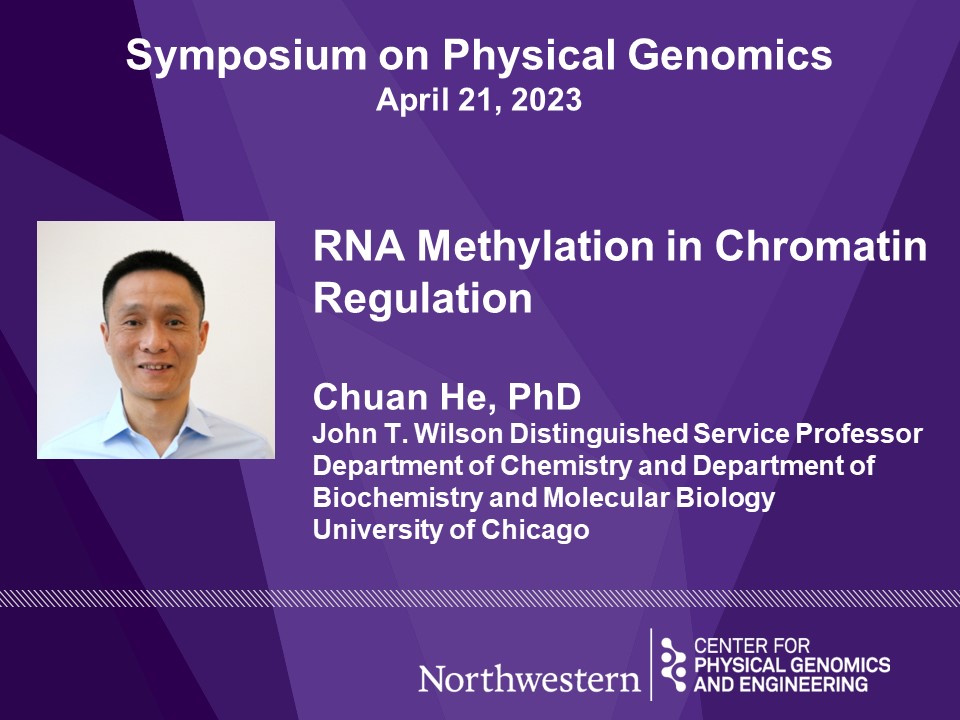
Chuan He - RNA Methylation in Chromatin Regulation
Dr. Chuan He of the University of Chicago presents his research at the 2023 Symposium on Physical Genomics.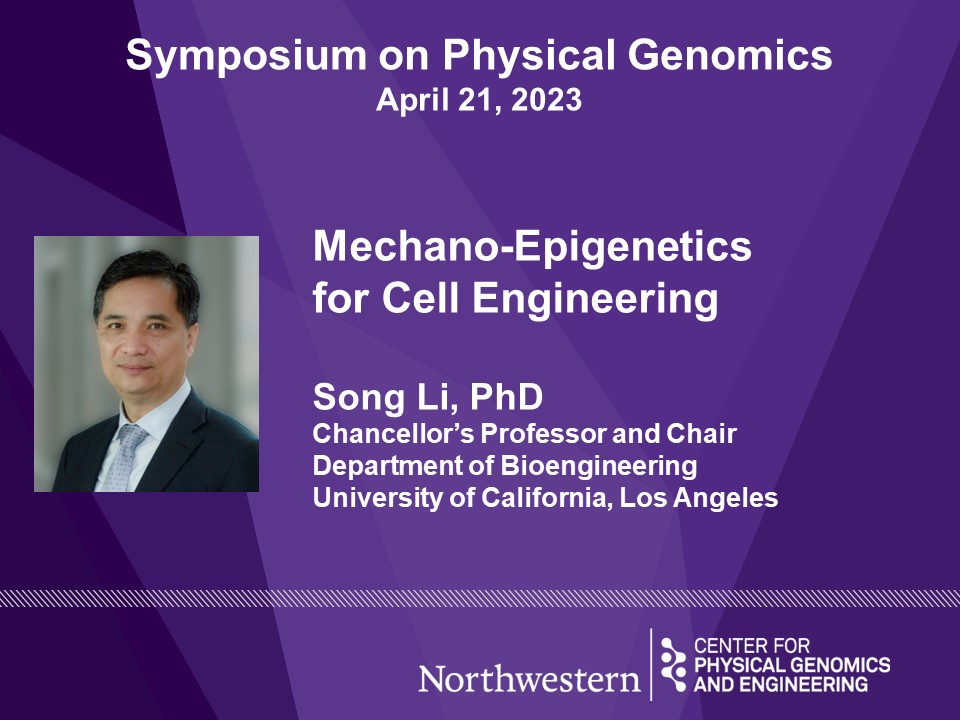
Song Li - Mechano-Epigenetics for Cell Engineering
Dr. Song Li of the University of California, Los Angeles presents his research at the 2023 Symposium on Physical Genomics.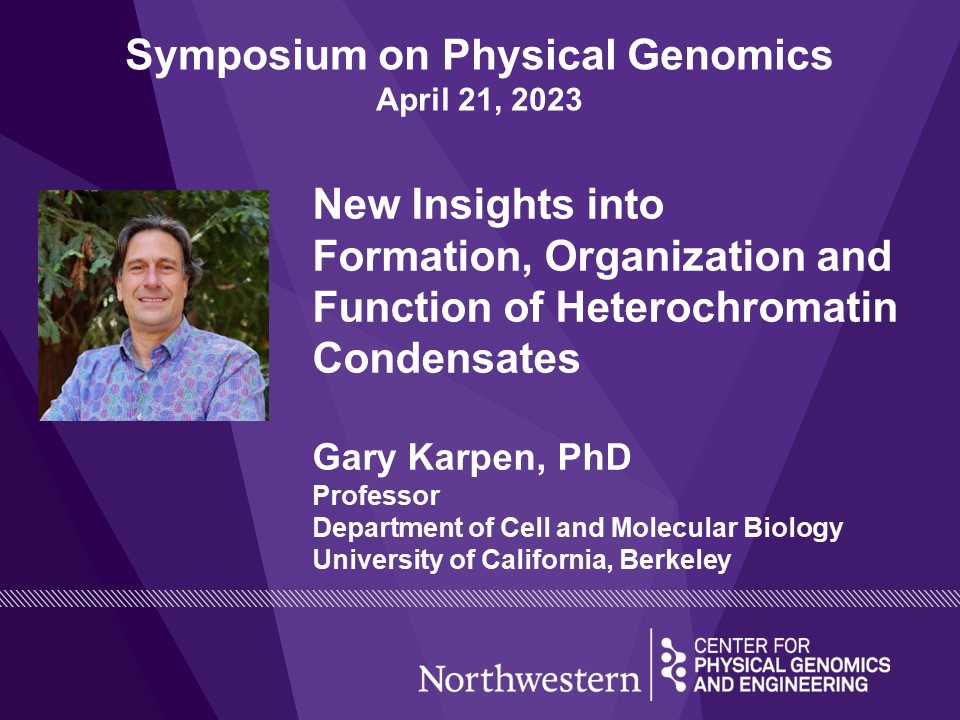
Gary Karpen - New Insights into Formation, Organization and Function of Heterochromatin Condensates
Dr. Gary Karpen of the University of California, Berkeley presents his latest research at the 2023 Symposium on Physical Genomics.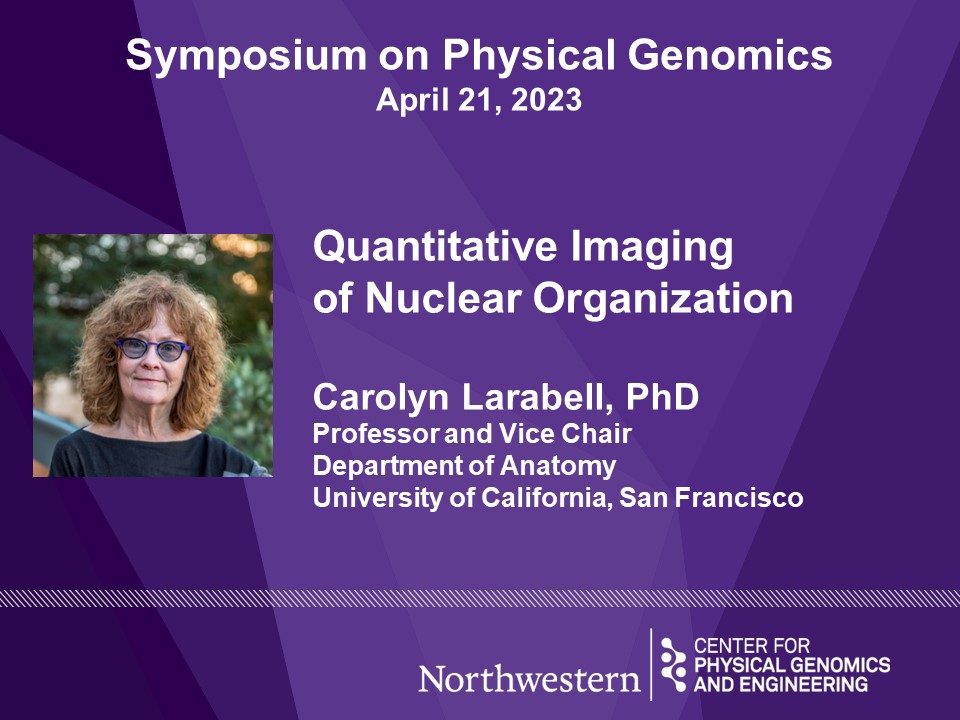
Carolyn Larabell - Quantitative Imaging of Nuclear Organization
Dr. Carolyn Larabell of the University of California, San Francisco presents her research at the 2023 Symposium on Physical Genomics and Engineering.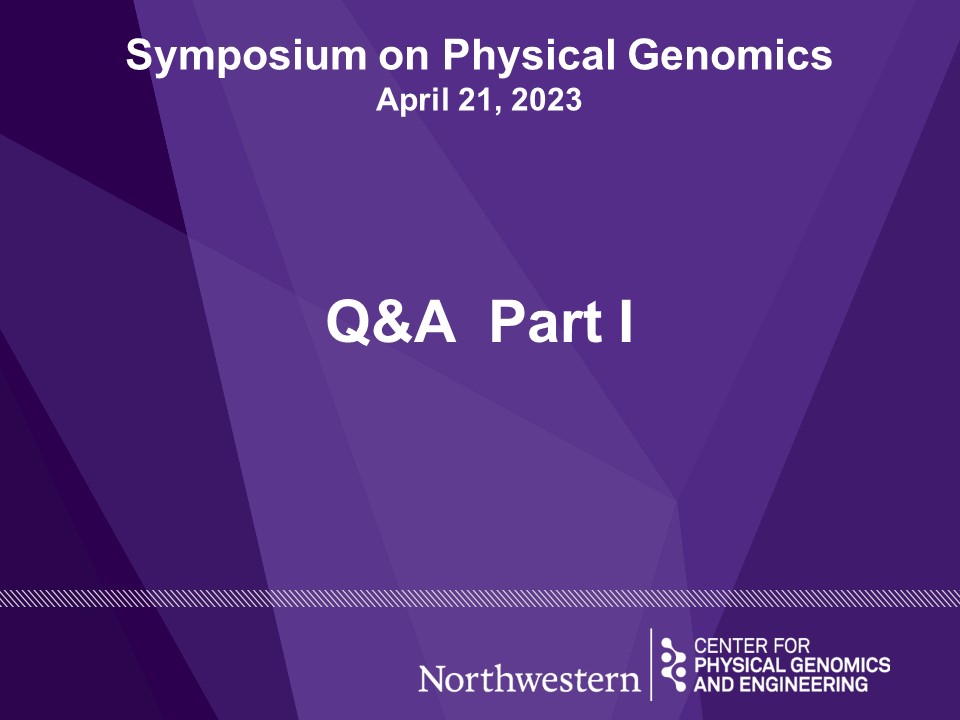
Question and Answer - Part I
The invited speakers at the 2023 Symposium on Physical Genomics answer questions from the audience. Part one of two.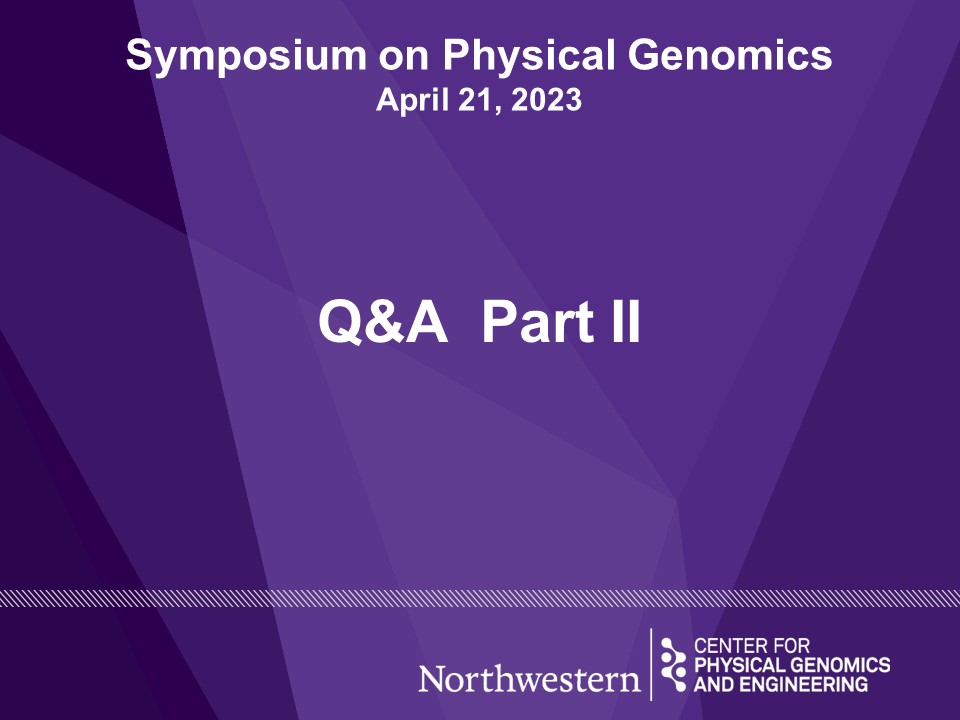
Question and Answer - Part Two
The invited speakers at the 2023 Symposium on Physical Genomics answer questions from the audience. Part two of two.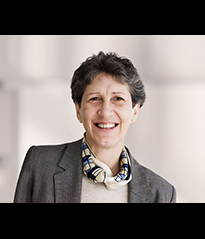
Susan Gasser - Chromatin and Nucleosome Density: How DNA Damage Response Alters Chromatin Dynamics
Dr. Susan Gasser of the Friedrich Miescher Institute for Biomedical Research presents the March 2023 Monthly Seminar on Physical Genomics.
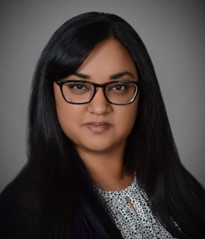
Dr. Meenal Datta: Abnormal Mechanics in Brain Tumors: Implications for Immunotherapy
Dr. Meenal Datta of the University of Notre Dame presents the April 2023 Monthly Seminar on Physical Genomics.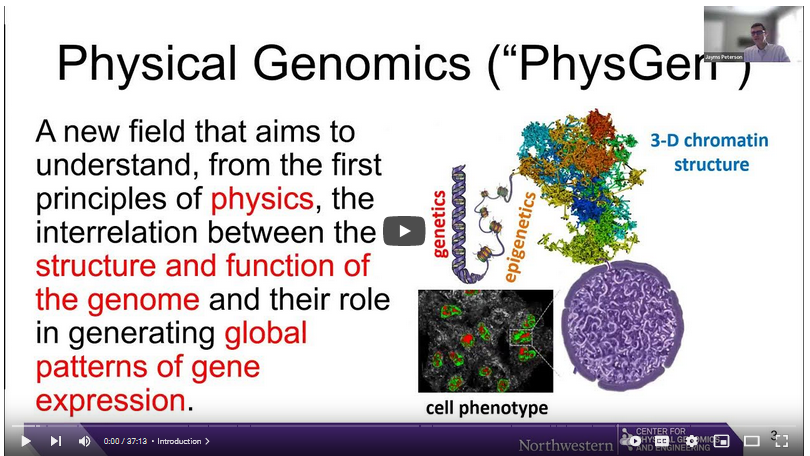
Physical Genomics Training Program Seminar - Feb. 15, 2022
Dr. Vadim Backman, Director of the Center for Physical Genomics and Engineering at Northwestern University, and PGTP Administrator Dr. Jayms Peterson provide an overview of the NIH T32 Physical Genomics Training Program at Northwestern and discuss exciting developments in this fascinating new field of convergent science.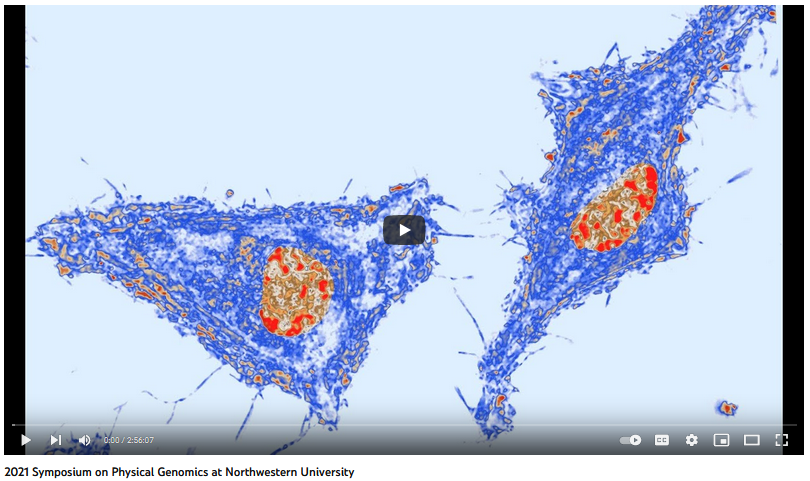
2021 Symposium on Physical Genomics
The 2021 Symposium featured lectures by world-renowned scientists including Dr. Richard Kriwacki, St. Jude Children’s Research Hospital; Dr. Melike Lakadamyali, University of Pennsylvania; Dr. Andrew Spakowitz, Stanford University; Dr. Vivek Shenoy, University of Pennsylvania; and Dr. Song Li, UCLA.
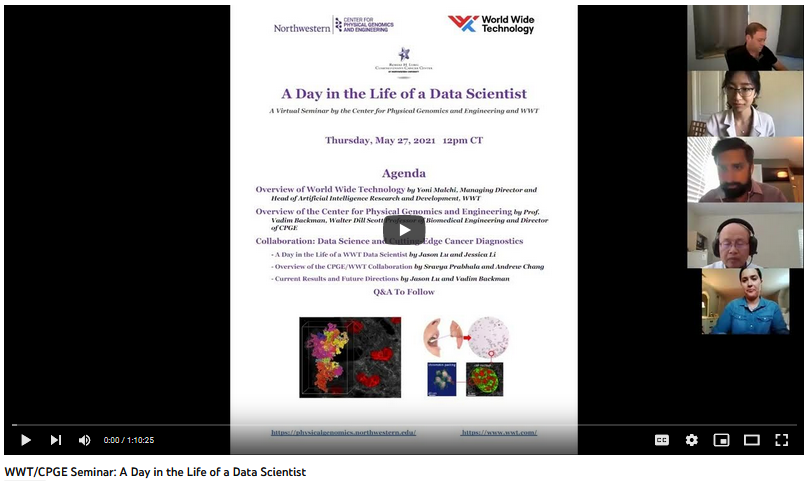
WWT/CPGE Seminar: A Day in the Life of a Data Scientist
This seminar provides insights into the reality of a career in data science and an overview of a unique collaboration between World Wide Technology, which provides technology and supply chain services with a focus on the enterprise commercial, public and telecom service provider sectors, and Northwestern’s Center for Physical Genomics and Engineering (CPGE)